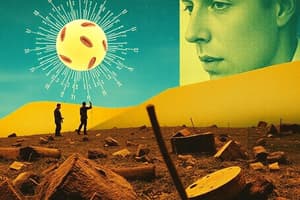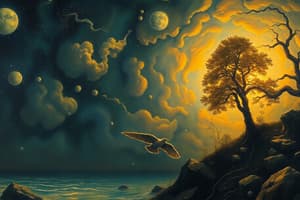Podcast
Questions and Answers
What is the Theory of Spontaneous Generation?
What is the Theory of Spontaneous Generation?
The belief that life can arise from non-living matter.
Who challenged the idea of spontaneous generation with an experiment involving meat and maggots?
Who challenged the idea of spontaneous generation with an experiment involving meat and maggots?
- Francesco Redi (correct)
- Lazzaro Spallanzani
- John Needham
- Louis Pasteur
What did John Needham claim in his experiment?
What did John Needham claim in his experiment?
He claimed to support spontaneous generation with boiled broth.
Lazzaro Spallanzani supported the theory of spontaneous generation.
Lazzaro Spallanzani supported the theory of spontaneous generation.
What did Louis Pasteur contribute to the theory of biogenesis?
What did Louis Pasteur contribute to the theory of biogenesis?
What hypothesis did Rudolf Virchow develop in 1858?
What hypothesis did Rudolf Virchow develop in 1858?
According to Creationism Theory, God created everything on earth at once in the book of _____?
According to Creationism Theory, God created everything on earth at once in the book of _____?
Match the following scientists with their contributions:
Match the following scientists with their contributions:
Flashcards are hidden until you start studying
Study Notes
Theory of Spontaneous Generation
- Life was thought to originate from non-living matter, a concept held until the 17th century.
- Common examples included maggots emerging from decaying meat and mice from grain.
Key Figures and Experiments
-
Aristotle: Established foundation for abiogenesis, suggesting life could emerge from non-life.
-
Francesco Redi (1668):
- Conducted experiments using meat in jars to show that maggots come from flies, not spontaneously from meat.
- His work challenged and helped to disprove the spontaneous generation theory.
-
John Needham (1745):
- Attempted to support spontaneous generation with an experiment using boiled broth.
- Concluded microbial growth indicated spontaneous generation; however, his flawed methodology allowed contamination due to inadequate boiling and unsealed flasks.
-
Lazzaro Spallanzani (1729-1799):
- Advanced the argument against spontaneous generation by suggesting that microorganisms in broth were due to air contamination.
- His experimental work laid crucial groundwork for Louis Pasteur's later research and contributed to the germ theory of disease.
Biogenesis
- Biogenesis, formulated in 1858 by Rudolf Virchow, states living organisms arise only from other living organisms.
- Supported by Louis Pasteur’s experiments, which demonstrated that microorganisms originate from existing contaminants, not spontaneously from the air.
Louis Pasteur (1822-1895)
- Renowned French microbiologist known for pivotal discoveries in vaccination, microbial fermentation, and pasteurization.
- Acknowledged as the “Father of Bacteriology & Microbiology”.
- His findings provided substantial evidence for the theory of biogenesis, asserting that complex living organisms derive only from reproduction.
Creationism Theory
- Posits that God created the earth and all life forms simultaneously.
- Biblical Genesis outlines a sequential creation process:
- Day 1: Creation of light
- Day 2: Separation of waters with a vault
- Day 3: Emergence of vegetation and seed-bearing plants
- Day 4: Creation of celestial bodies to divide day and night
- Day 5: Creation of sea creatures and birds
- Day 6: Creation of land animals and humans, made in God’s image.
Studying That Suits You
Use AI to generate personalized quizzes and flashcards to suit your learning preferences.




